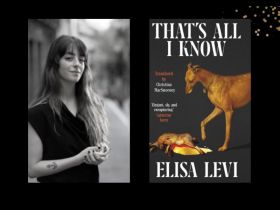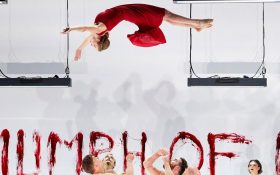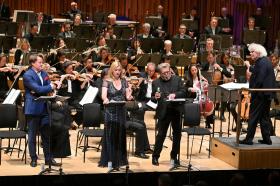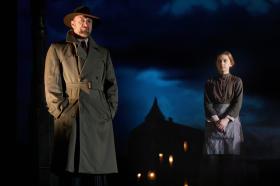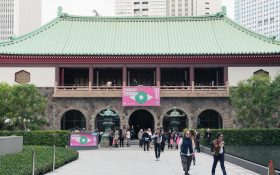What does it feell like to write a best-selling book? Rusty Young published the very successful book Marching Powder in 2003.
Rusty has a degree in law, and has worked in banking, as well as been a barman, shoe salesman and English teacher and voluntary prisoner in the Bolivian jail his book was set in. But writing is his real passion. Four years on from Marching Powder, he’s just resigned from his day job to finish his second book in South America.
The ingredients in Marching Powder are a powerful combination: It is non-fiction, and involves a Bolivian jail, drug trafficking, a curiously charismatic British inmate named Thomas who started tourist tours to the jail, plus a bit of adventure and suspense. The book was published in fifteen countries including the US, UK and Australia, where it sold very well. An accompanying documentary was made and the film rights have been optioned by Brad Pitt‘s production company Plan B. There have also been offers to translate it.
Hi Rusty, I hear you’re working on a new novel – has anyone looked at your new book yet? And when will it be finished?
I haven’t shown it to anyone but friends, but I just quit my job to work on it full time. I was working a corporate job but writing is really a full-time job and it’s hard to switch between the two. I’ve given myself to the end of 2007 to finish it.
So no more day job?
I’ve never been about making money but having an alternative income while you’re trying to make it as a writer is certainly helpful providing it eventually frees you up to do what you want to do. That’s how I see money – it’s the currency by which you buy back your freedom.
And I hear Brad Pitt has optioned the film rights for Marching Powder – are you writing the screenplay?
Niels Van Iperen made a documentary which we edited with and aired on ABC’s Foreign Correspondent programme in Australia. Subsequently I have sold the movie option to Plan B, a Hollywood company owned by Brad Pitt and Brad Grey (Executive Producer of Sopranos). They recently released The Departed. The initial script writer (Chris Zalla) just won the 2007 Sundance Film Festival with his first writer/director piece Padre Nuestro. Don Cheadle (Crash, Hotel Rwanda) is attached to play Thomas and also as a producer. But there’s no certainty it will get made.
What do you say your profession is when asked?
I say I’m a writer, and I even said that before I published a book. I think being a writer is how you view the world and how you think of yourself. People’s identities are tied up with how they make money. Whereas being a writer is about the way you think about the world. So when you say to someone ‘I’m a writer’ and they say ‘really, what have you published, what have you written, how many copies have you sold?’ It’s like, that’s not relevant, you should be asking me what do I write. It’s funny society only recognises people who have made money out of art as being ‘artists’.
When did you realise you wanted to be a writer?
It was a very conscious decision. When I was 13 I had a teacher who used to make us write a diary. I started experimenting in the diary writing short stories and poems. I write best in the first person having had so much experience writing in the first person in the diary. That’s why Marching Powder is written in the first person. From about 15 onwards, I knew I wanted to be a writer but I felt I just didn’t have anything to say to the world and that it was a bit presumptuous to write a book when you’re 20 and you’ve just left school. I had to have a fallback position and support myself. So I did a law and finance degree and worked various jobs. I always knew that it was what I eventually wanted to do, but I guess part of only starting writing at the age of 24 was that incredible fear of failure. What if you devote a whole year or two of your life to doing something then it gets rejected, how crushing is that blow going to be?
Who are your favourite books and authors?
My favourite book is The Catcher in the Rye. I absolutely love In the Skin of a Lion. A Clockwork Orange, by Anthony Burgess, it’s a bit like reading Trainspotting. I love Marquez, and I’ve started reading that in Spanish and it’s just so much better it’s amazing, having lived in Colombia where he was writing. He would probably be my favourite author.
Are you an avid reader?
When I was writing the book I didn’t read anything because I didn’t want to be influenced, and partly because I didn’t have enough time. My mum was an English teacher so she gave me good books to read when I was young. As an adult I’m a slow reader and don’t read that many books. Maybe 5 a year?
How long did it take you to write Marching Powder?
The research part was for 4 months, I stayed in the prison and lived with Thomas. Then the next 2 years following that was when I was writing it. I had to work when I was doing that – to support myself living in South America. I got a job teaching English and I also learnt Spanish and got a job as a translator. I could start writing a chapter and if I got writer’s block I could change programmes and do a translation. The part time job, which was helping me to survive, also provided a structure to my day. I think if you concentrate solely on one project you can get too bogged down in and you haven’t got a very balanced life. It’s great to have another reason to get up in the morning. When I was younger I had this dream of myself as being by day ‘mild mannered lawyer’ and by night ‘super writer’. It astounds me how people who have families, or full time jobs, find the time and the energy to write.
Why did you choose non-fiction, and not a novel, to tell this story?
Because it is a true story, that classifies it as non-fiction. Fear of failure was a huge impediment to even trying to write a book or get published. I had lots of other ideas when I was younger about books that I wanted to write, probably a bit more personal, but it was an ideal project to start on because it was someone else’s story. So I guess if it had been rejected it wouldn’t have been necessarily a complete rejection. I think writers in general are pretty sensitive.
Do you think the fact that it’s non-fiction made it easier to get a publisher?
Definitely. I think the fact that it was a sensational story was what really captured the publisher’s attention. Especially on your first book, you’ve got to realise that publishers are not in the business of developing literary talent; they are in the business of selling books. And if you’re an unpublished author you’ve got to have something that gives the publisher something to grab I guess. Something saleable. And the story itself was what drives this book, and was the key to marketing it. It’s a bit cynical to start out thinking I should write a book around the marketability or salability of something but my intention now is to write completely different types of book, that I’m fairly sure wouldn’t otherwise have been published. I don’t want to get ahead of myself but you’d assume that if the book does well you should be able to find a publisher for the next one. So in some ways the book I want to write next is really my first one. It’s the one I started on when I was 20 and never got round to finishing and I think if I had finished – I can’t say this because I haven’t done it – but I imagine it wouldn’t have been marketable at all.
Simply because it would have been another novel by a first time author?
Yes. There’s two arguments, people say ‘this has all been done before, why is your product any better’ or you write some thing that is so ‘out there’ that’s it’s not going to be marketable at all. I think you’ve got to bear in mind that publishers are taking a financial risk and they are inherently conservative, so you’ve got to give them something that is going to have some likely chance of recovering their costs. I think a lot of writers progressively sell out, and I’m trying to pioneer a concept called the reverse sell out, where you do something which is a bit more marketable, a bit more commercial to break into the market and then hopefully that can give you some more scope to do more creative things and do stuff that you want to do yourself.
As you were writing your first book were you confident? Or were you up and down about it?
It fluctuated. At first I was thinking ‘there’s just no doubt that this is going to get published’. Then there are other times where you hit real low, a year and a half later when you haven’t finished the book that you set out to write. I think the self-doubt is important to your editing of the book, the way you cast a critical eye upon it. I was writing it because I thought it was a story worthwhile telling. But by the end, I was so sick of the book and so sick of being poor that it became a factor. You start off wanting to write a masterpiece, with strong artistic integrity and in the end you realise that you’ve put so much of your life and so much of your energy into it that it is important to find a publisher and to get some recognition for the work you’ve put in. Being a writer is fun, but writing books is hard work. You put yourself through absolute emotional hell as a writer. Living in Colombia, not having any money, there were points where there were three of us sleeping in one room on the floor, literally, and they cut the electricity, we were eating lentils and rice for dinner, we couldn’t afford toilet paper. So I really had to go through a lot of trials to get there but that’s part of the journey.
How did you get it published?
As I was writing it, I was sending out emails from La Paz, from the prison, with two aims. Trying to get feedback from friends, and also trying to develop interest. They were basically draft chapters and I was experimenting with the style, writing in the first person, the third person, writing it from my point of view, from Thomas’s point of view. The book in its final form bears little resemblance to what it started out as. But I found the Internet to be a very valuable tool in that sense. When it was about 90% done, I suppose because of the strength of the story more than the strength of the writing, these emails were being forwarded on to other people. Eventually it got onto the desk of someone who was in the publicity department of the publisher I went with, Pan Macmillan. It also reached the BBC and it reached some other publisher in New York. And I got three emails from Dutch publishers. Email is a pretty good marketing tool. The final straw for me was my credit card went over the limit and I had no more money. I’d flown to South America twice and even though I was working I still had other expenses. So basically it because a financial necessity to see if this book, two years of hard work, was going to pay off. At least pay off the credit cards. When my credit card went over the limit was when I decided I had to send this into a publisher to bite the bullet. Because it’s non-fiction, part of the pitch to the publisher was to send some photos in, which illustrated what the book was about. I made a visual presentation of the content of the book – a PowerPoint presentation. You have to do anything to make it stand out from the slush pile. I could never have done that with fiction. It’s all about shameless self promotion. It sounds rather cold and cynical to look at it that way if you’re a true artist, which most writers think of themselves as being. But that’s the reality: it is an industry. The commissioning editor read a few chapters and rang me the same day and asked me to lunch the next day and said yes and then offered me a contract the day after that. So it all happened very fast.
With a best seller under your belt have you been recognised on the street, stopped for autographs?
After being on television someone stopped me at the airport. A woman hugged me in the street once and said ‘you’re my hero’… Writing a book is such hard work that you just feel relieved rather than proud. The material success you get from it or the public recognition is really only secondary to the reward of having completed this life mission or this incredibly personal project, personal journey. That’s really still what is most present in my mind – the personal achievement of having written a book.
What do you see as the role of the author today?
I don’t know if I’m qualified to answer. Bill Gates predicted that there will be palm readers and no physical books by 2003. And I suppose a lot of people have wondered whether the advent of new technology would spell a death of books and writing and literature, but I really think it’s as relevant as it always was and will continue to be so. There’s no substitute for a direct path into someone’s mind which a book offers and offering different ways of looking at the world.
What are you writing next?
Two things; the one that I started when I was 20, it’s fiction, I haven’t worked out how to do it fully. Hopefully it will be easier, it was pretty ambitious for a book, way too ambitious for a first book, but now I know how to write a book, I think it will be a bit easier. The other is a book about Colombia, but again, fiction but based upon what I’ve seen and what I’ve heard in Colombia. Drawing inspiration from life experiences but fictionalising them. It’s called Paradise Prisoners, about child soldiers in Colombia. I’m also hoping to get some travelling in and learn the bongos in Cuba!!
What do you dream about doing?
Too many things to list, but first and foremost writing more books. I’ve got about four going at the moment (obviously concentrating primarily on the current one, but the others sometimes creep in and I’ve got to write the ideas when the inspiration is fresh).
What have you sacrificed for your art?
I think you give up money and social status while you’re writing it (which sounds superficial, I know, but until you’ve done it then you won’t realise that these things do matter!!). I think you give up the psychological security and comfort of having a job and regular income as well as a “normal” life, especially if you leave your home environment to do the research and writing. Finally, in my case, there was a certain risk I had to take to get Marching Powder written – living in the prison. I also got arrested while doing the research and we got chased from the country when doing the doco. But that was also part of the fun!! The research for the current book is also dangerous at times. It’s not clever to ask too many questions in a country with the highest incidence of kidnapping in the world…
Marching Powder is available at all good bookstores, or through Amazon.
